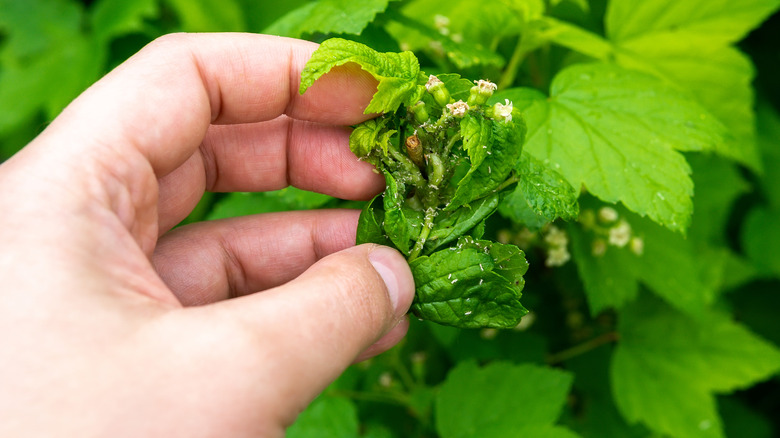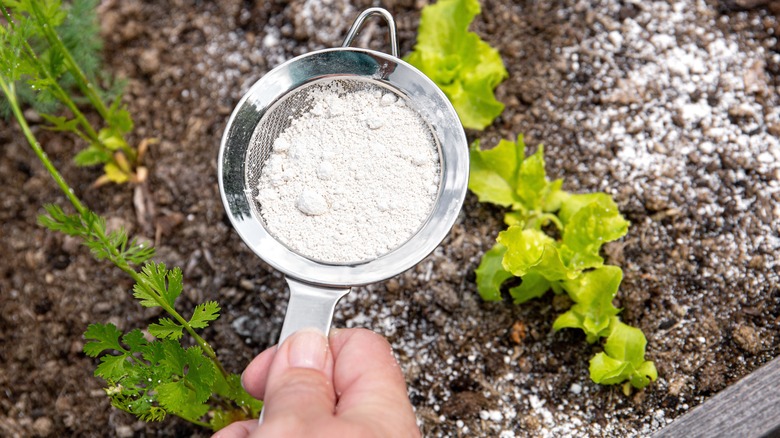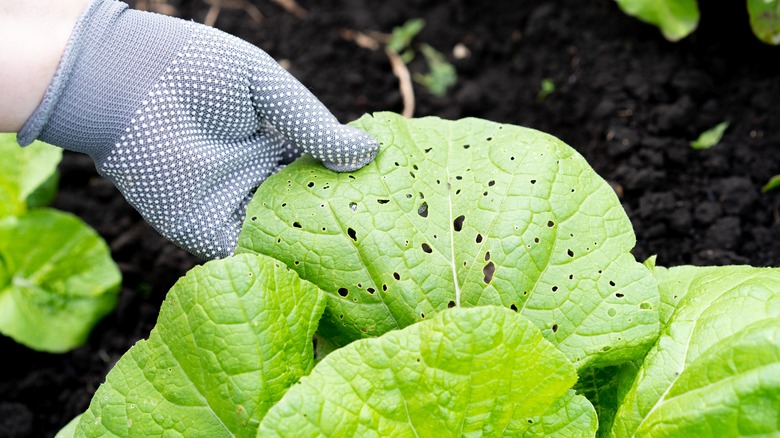Sprinkle Flour In Your Garden To Banish Aphids For Good
Aphids are small, soft-bodied insects that are commonly found in gardens and agricultural settings. These tiny insects feed on the sap of various plants and reproduce rapidly, establishing large populations in a short time. Aphids wreak havoc in gardens due to their feeding behavior. They weaken the plants, leading to stunted growth, distorted leaves, and reduced crop yields. Additionally, while feeding on the sap, aphids secrete a sticky, sugary substance called honeydew, which attracts ants and promotes the growth of black sooty mold, further harming plants.
Moreover, aphids are notorious transmitters of plant diseases. They can spread various viruses and bacteria from one plant to another as they move from feeding site to feeding site, potentially causing widespread damage to an entire garden. It's important to take precautions against aphids and to immediately begin treatment upon first sight. But before you run out to buy expensive chemicals that can further damage your plants or the environment, consider using flour from your kitchen to disrupt the life cycle of these insects and prevent them from multiplying.
How to add flour to your garden
Using flour to get rid of aphids in your garden is a popular and natural method that can be effective. The process involves using all-purpose flour, which can be found in most kitchen pantries, to create a physical barrier that interferes with aphids' ability to feed and breathe, eventually leading to their elimination. Inspect your garden carefully to locate the areas where aphids are most active and causing damage to your plants. Grab your all-purpose flour, as it is readily available and affordable. Avoid using self-rising flour or any flour with added ingredients like baking powder, as it may not be as effective. Ensure that the weather is dry before applying flour to your garden. Rain can wash away the flour, reducing its effectiveness.
Fill a fine-mesh sieve or a small handheld sifter with all-purpose flour. Gently shake the sieve over the affected plants, making sure to cover both the upper and lower surfaces of the leaves. The flour creates a physical barrier that can suffocate the aphids and hinder their feeding. Monitor the garden regularly for any signs of aphid resurgence. If necessary, reapply the flour to affected plants until the aphid population is under control. To prevent future aphid infestations, practice good gardening habits such as maintaining plant health, providing adequate spacing between plants, and removing any weeds that may attract aphids.
Why it works
Using flour can be effective at controlling aphids due to its physical properties. When all-purpose flour is applied to affected plants, it forms a powdery coating on the leaves and stems. This coating hinders aphids' ability to feed and breathe properly. Additionally, the fine particles of flour clog the aphids' digestive system. As a result, the aphids are both unable to obtain the necessary nutrients for their survival and unable to secrete their honeydew, leading to their eventual death.
Furthermore, the flour coating also hampers the aphids' spiracles, which are small openings on their bodies used for respiration. The blockage of these spiracles restricts the aphids' ability to breathe, ultimately suffocating them. Another advantage of using flour is that it is a safe and non-toxic method of pest control. Unlike chemical pesticides, flour does not harm beneficial insects, wildlife, or the environment. It is an eco-friendly alternative that gardeners can use without worrying about adverse effects on other living organisms.
While flour can be an effective short-term solution for controlling aphids, it may not completely eradicate a large infestation. It works best when used in combination with other integrated pest management strategies, such as introducing natural predators or practicing good gardening practices to keep aphids at bay and maintain a healthy garden ecosystem. If the aphid problem persists or becomes unmanageable, consider consulting a professional gardener or agricultural expert for additional advice and assistance.


